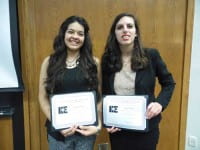The IMSE Department celebrated graduates from the Summer, Fall, and Spring semesters as well as award winners with a banquet Thursday evening. The event began with a reception as Advisory Board members, faculty, staff, and honorees and their friends arrived at the banquet inside the Hospitality Suite at UT Arlington’s College Park Center. A catered meal was served after the reception as guests took their seats for dinner.
After the meal, Dr. Chen introduced IMSE alumna and co-founder of TransSolutions, LLC Gloria Bender, as the keynote speaker. She spoke about the importance of getting your degree and giving back to the community and how IEs could use their degrees to serve.
After the keynote address, Dr. Brian Huff recognized the members of the Alpha Pi Mu Industrial Engineering Honor Society. The attendees gave the members in attendance a round of applause.
The first award given in the evening was the G. T. Stevens, Jr. Endowed Alumni Scholarship which was established in 1998 to honor the IMSE Department’s former Chair. This year’s recipients were April Shortt (Junior), Ting Xiao (Senior), and Ezeh Perpetua Ebere (Graduate).
Next, Dr. Bill Corley presented the Elinor Pape Endowed Scholarship Award, which was established in 2006 to honor the Professor Emeritus’s service and dedication at UT Arlington. The award winners were Cynthia Rodriguez (Junior), Gustavo Robles (Senior), and Vikas Hinge (Graduate).
The next two scholarships were established by IMSE alumnus Keith Weiss. Keith and Carolyn Weiss were on hand to award Dylan Slick with the Keith and Carolyn Weiss Industrial Engineering Scholarship, which is given to deserving Industrial Engineering undergraduate students who are working to support their education. Slick works as a Resident Assistant at UT Arlington Apartment and Residence Life. The Weiss Family Endowed Scholarship is an award distributed by the UT Arlington Alumni Association to award a junior or senior undergraduate who have been working to support their education. This year’s recipient was Greta Leza who works at Airbus Helicopters, Inc. (formerly known as American Eurocopter).
The next award given, the John and Pat Priest Family Endowed Scholarship, is the IMSE Department’s newest endowed scholarship. It was established by current IMSE professor John Priest and his wife in 2013. This year’s winner was Colin Brisco.
The next two scholarships were awarded by the RFID and Auto ID (RAID) Labs. Dr. Erick Jones presented the awards to the winners. This year’s recipient of the RFID and Auto ID Labs Research Excellence Scholarship, which recognizes students for his/her excellence in RAID research and published work, was Harrison Armstrong. His research paper, “A Framework for Detecting Hazardous Events Occurring in Transit with AutoID Technologies” was accepted by IIE Sensors in March 2014. The RFID and Auto ID Labs Outstanding Research Scholarship recognize students conducting outstanding research in RAID Labs. This year’s recipients were Mewan Wijemanne (Undergraduate) and Ryan Dietrich (Graduate).
The Institute of Industrial Engineers (IIE) Outstanding Student awards recognizes outstanding scholarship, leadership, and service to the IE profession. This year’s recipients were Cynthia Rodriguez (Junior) and Rachel Machbitz (Senior). After receiving their award, they were joined by previous Outstanding IIE Award winners.
The final award presented in the evening was the Texas Industrial Engineering Lifetime Achievement Award, which was created in an alliance between the Industrial Engineering departments at Texas public universities including UT El Paso, Texas A&M, Texas Tech University, the University of Houston, and Lamar University. Awardees are alumni selected by these universities based on the impact of their career on society. Gloria Bender presented the honor to this year’s awardee, Gloria Maceiko. Maceiko founded DirectNu Energy in 2009 with a vision to develop Energy Independence for commercial entities, nationally and globally, by focusing on solar and wind project development. She serves as its CEO and manages multimillion dollar projects from concept to contracts and worked over 25 years with high tech companies in Silicon Valley. She was also at the forefront of trend setting startups.
The wonderful evening concluded with a few brief comments from our graduating seniors and a final congratulation to award winners and graduates of the past year.
Pictures of the event will be posted on our Facebook page soon!
